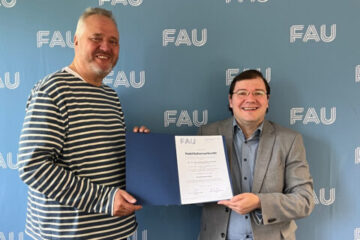Dr. rer. nat. habil. Jochen Schmidt has successfully completed his habilitation in the field of particle technology. The Dean of the Faculty of Engineering, Prof. Dr. Kai Willner, congratulated him on receiving his habilitation certificate. Mr. Schmidt revealed his motivation for his habilitation and his plans for the future in a short interview. He gave a presentation on his research to the public at “Tag des CBI” on 18 June 2025 and is now a Privatdozent at the Faculty of Engineering.
Topic of the habilitation thesis
“Powder feedstocks for laser powder bed fusion of polymers: production, functionalization, characterization”
What motivated you to do your habilitation?
There were several reasons for this. I have been working in science for some time now and have learned how to successfully raise funds and carry out research projects at the Institute of Particle Technology (LFG) over the years. As part of the Erlangen Collaborative Research Center 814 “Additive Manufacturing” and in other projects at the institute in the field of “Powder Materials for Additive Manufacturing”, I was also able to gain experience in leading a group and taking on project responsibility. I got insights how large research projects with many partners work. Scientific independence and experience in leading a group were therefore “already there” and therefore not the reasons that motivated me to pursue a habilitation.
However, what I lacked somewhat in my work was greater involvement in teaching and further training in didactic concepts. I was able to develop my skills in this area during the habilitation process. I gained new experience, particularly by designing and teaching the course “Polymer Recycling” (Master’s degree course in Clean Energy Processes). Furthermore, the habilitation also gave me the opportunity to present and evaluate my work on the development of processes for the production, functionalization and characterization of powder feedstocks for powder bed fusion additive manufacturing in the context of the state of the art in a monograph. Finally, the habilitation is a useful further qualification for a scientific career.
What are your plans for the future?
I will continue to pushe ongoing research projects in the group at the Institute of Interfaces and Particle Technology, expand my collaborations with project partners and establish new collaborations. I will continue to be involved in the courses organized by the institute as well as scientifically supervise doctoral candidates and undergraduates. In addition to further developing my current projects in the priority program SPP 2289 “Heteroaggregates” and SPP 2364 “Autonomous Processes”, I intend to expand the group and set up new, also strongly application-oriented projects in this context. Amongst others, I have some research ideas on recycling processes for plastic powders for additive manufacturing and on recycling of mixed plastic wastes in general, which I would like to turn into project proposals in the course of the year.

